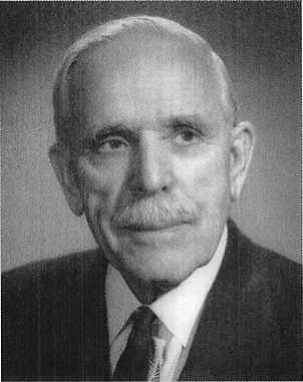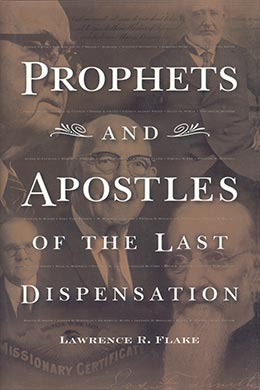Joseph Francis Merrill
Lawrence R. Flake, Prophets and Apostles of the Last Dispensation (Provo, UT: Religious Studies Center, Brigham Young University, 2001), 457–59.

Born: 24 August 1868, Richmond, Utah
Quorum of the Twelve Apostles: 8 October 1931 (age 63)
Died: 3 February 1952 (age 83), Salt Lake City, Utah
The London office staff of the European mission may have thought their new mission president somewhat austere. He lived in a fourth-floor apartment with no elevator, ate a modest diet with little meat or rich foods, exercised in the mornings, walked each evening, and shaved with cold water. He also counseled them to turn the lights out when leaving a room. But these frugal and healthful habits were only the exterior of Brother Joseph F. Merrill, a man careful with Church funds but generous with his own means. The sign on the door, “European Mission” gave occasional passersby the idea that it was a soup kitchen, and destitute wanderers sometimes rang the bell. President Merrill never let them go away hungry. One of his missionaries recalled seeing a poorly clad young man leaving, wearing one of the mission president’s own coats.
Joseph F. Merrill was a scientist by education, having received degrees from the University of Utah, the University of Michigan, and the Johns Hopkins University. He also studied summers at Cornell University and received an honorary doctor of science degree from the University of Utah. He was a faculty member in the physics and chemistry department of that institution for many years and later became dean of the School of Mines and Engineering.
Scientific pursuits never interfered ideologically or practically with Brother Merrill’s devotion to the Lord. As a student in Ann Arbor, Michigan, he was also branch president. In Salt Lake City he served as a member of the Granite Stake presidency and in that capacity originated the idea of a released time seminary at Granite High School. When Elder Merrill later became the Church Commissioner of Education, he expanded the idea and, as a result, has since been considered more than anyone else to be the father of the seminary program of the Church. Brother Merrill was ordained a member of the Quorum of the Twelve on 8 October 1931.
Born of humble means to apostle Marriner W. Merrill and Mariah Kingsbury near Richmond, Utah, Joseph learned early the lesson of industry. He worked as water boy to a railroad construction gang when he was only eleven, and at the age of thirteen he was driving team for construction crews, a job usually filled by a full-grown man. In 1898 he married Annie Laura Hyde; they had seven children before her death in 1917. He never ceased to work, and he often said he had never missed a day’s work because of illness. At the Church Office Building he was known for keeping long hours, arriving habitually at seven-thirty in the morning, and not leaving until the same hour in the evening. Elder Merrill was blessed to leave this life as he wished—fully active. [1]
The First Presidency wrote these descriptive words at his passing: “For years he has fulfilled every call made upon him, never excusing, never shirking, never complaining. . . . His faith was great; his courage, unflinching; his ardor, never wavering. He was bold in denouncing evil. . . . His was a great voice in behalf of righteousness. Over a long and active life, he gave his all in the service of the Lord.” [2]
Notes
[1] David O. McKay, Stephen L Richards, and J. Reuben Clark Jr., “First Presidency Pays Tribute to Elder Joseph F. Merrill,” Improvement Era, March 1952,144; see also Gordon B. Hinckley, “Church Mourns Passing of Elder Joseph F. Merrill,” Improvement Era, March 1952, 144–47, 203–5.
[2] Ezra Taft Benson, “Elder Joseph F. Merrill,” Relief Society Magazine, April 1952, 217–18.
